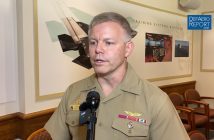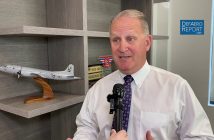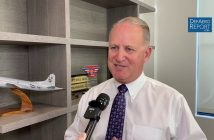Fred Kempe, the president and CEO of the Atlantic Council think tank, discusses the need for a global NATO and the alliance at 70, his take on Vice President Mike Pence’s address to the NATO Engages conference — co-sponsored by the Atlantic Council, German Marshall Fund, the Munich Security Conference and other key think tank’s — as well as NATO Secretary General Jens Stoltenberg’s address to the US Congress. The interview was conducted at the NATO Engages event marking the 70th anniversary of the Washington Treaty that founded the alliance on April 4, 1949, with 12 nations that over the decades as grown to 29 nations.
Vago Muradian: Welcome to the Defense and Aerospace Report. I’m Vago Muradian here in Washington, DC at the 70thAnniversary Commemoration of the Atlantic Alliance, a conference here NATO Engages, sponsored by the Atlantic Council of the United States, the German Marshall Fund and the Munich Security Conference, and we’re honored to have with us Fred Kempe who’s the CEO of the Atlantic Council. Always a pleasure, Fred. A towering figure in our industry, intellectually as well as physically.
Talk to us a little bit about the messages that we heard where the Vice President came and addressed the conference. In some respects, it was what folks wanted to hear. We didn’t hear Article 5, that was concerning to some. A tough message on Germany.
But we also heard an inspirational message that came from Jens Stoltenberg, the NATO Secretary General, making history, addressing a Joint Session of Congress.
Talk to us about the messages we heard from both of these very important leaders at a time when there are concerns about the future of the alliance.
Fred Kempe: Jens Stoltenberg, first of all, that was a historic moment. No leader of any international organization, multilateral organization, has ever spoken to a Joint Session of Congress. So it’s not just NATO. No leader. So it was a first, and he really delivered a terrific message, driving home for Americans why NATO is not just important to Europe but important to the United States. There were so many standing ovations I thought it was an aerobics class. But he was really great. So the message is a good one.
The paradox that we’re facing is that NATO is working more closely together under the Trump administration with more money involved, with defensive weapons for Ukraine, with a new brigade, with two new headquarters, with new training missions. So there’s more going on in NATO than there was in the Obama administration, but because of Trump’s attitude over his administration toward NATO, questioning the collective defense, questioning whether allies are carrying a burden, there’s this mixed message from the United States.
I think what we saw today is the clearest message of bipartisan, rock solid support one ever could have seen, and from the administration, one saw more than enough. I think the Trump administration has moved on to other issues, other problems, other things are front and center. I think it’s a little mean spirited for people to be worrying that Article 5 wasn’t mentioned as often as it’s been mentioned in the recent past.
So in the Pence message the two things that stood out, the news points, were going after Germany on spending and on Nord Stream 2, becoming too dependent on the Russians in terms of energy, which I agree with.
The other was a really tough message to Turkey about taking the Russian S400 missiles and how that’s not consistent with their message.
So on the one hand, that’s a tougher message, but it also is a credit to this conference that the Vice President would come here and speak with substance and not just with empty words.
Mr. Muradian: Also a lot of Foreign Ministers, the Turkish Foreign Minister was here making it very clear that Ankara was still going to press ahead with the S400, even if there was a threat over the F-35 not being delivered. Because as we saw, the Acting Defense Secretary Pat Shanahan left a little bit of a door open yesterday which the Turkish Foreign Minister appeared to close.
And then an interesting thing where the Turkish Foreign Minister, and this was more Steve Flanigan’s observation from RAND, how you balance NATO and Russia and obviously for a NATO ally there is no balancing, right? I mean NATO should be coming first.
How serious do you think is a rift in the transatlantic alliance? On the one hand the administration has done a lot of very positive things, but then there’s the constant rhetoric that comes from the President that Europeans find particularly grating at a time when we’re asking them, for example, to work more closely with us, not do things they want to do like Nord Stream, and to work harder on partnering against China.
Are you concerned about the future of the transatlantic alliance? Or do you think that’s overwrought?
Mr. Kempe: I’m concerned about the future but not for that reason.
What the NATO Secretary General said to Congress is the reason NATO’s been the most enduring alliance — average alliance lifetime is 15 years; this is 70 years and going on. The reason he said is it adjusts as the world changes.
I think the alliance is behind the curve in one respect. We’re in a new era of global competition. It does have 40 global partners outside of the NATO members but it hasn’t really leveraged those assets. It hasn’t worked with them enough. And I’m not necessarily calling for them to make these allies members, but it needs to thicken these ties and create what I’m referring to as a more Global NATO.
Don’t forget, remember when we used to talk about out of area or out of business. If NATO didn’t go out of the European area it would be out of business. So it went to Afghanistan. It stayed in business. If it hadn’t enlarged I think it would have gone out of business. It enlarged. Now I think if it doesn’t become more global, then I think its future is threatened, but it’s not Trump and it’s not one or two allies having a riff over the Iran Nuclear Agreement. We’ve been through worse and the alliance has held together. I think it’s really can it adjust to the future and the big new thing which is this new era of great power competition.
Mr. Muradian: So how do you do Global NATO? What are the benchmarks you would use for its expansion? Because there are folks that say okay, look, we have the United Nations, we have a lot of organizations like this. Why Global NATO? How does a Global NATO work? Does Brazil, for example, open the door given the President is sort of interested in bringing — that was your observation, right? I’m just sort of queuing you up on that.
How would the dynamics of this work? How would the mechanics of it work?
Mr. Kempe: There’s an easy way and there’s a hard way. The easy way is just to deepen the links that are there. So you have the 40 global partners. Just deepen what you’re doing with them. Train with them more. Make it more robust. Bring them into more discussions.
And the second thing that’s also relatively easy, is then create tighter links between the global partners that are in Europe and in Asia. That are in Asia and in Latin America. So make sure the global partners are then interacting with each other more.
Damon Wilson, the Executive Vice President of the Atlantic Council did House testimony and he then took it a step further, which is you could then create a network of alliances with the U.S. at the core, and it could really be what stands up to this authoritarian surge, this network of democratic alliances, which then could be a precursor over time to alliance of democracies, standing up for our principles and values at a time when we’re being challenged by rising authoritarian powers.
Mr. Muradian: And how would you do that? You were a very prominent journalist and editor in your day, Wall Street Journal among other publications. What’s the right way to do that, given that Orbán in Hungary, the Polish government has been very, very tough on not just freedom of the press but on rule of law. We have concerns about that even in the United States a little bit in terms of certainly the rhetorical messages coming out of that. Then we’ve seen it even in from some of the Black Sea countries.
What’s the right way for the alliance to cope with this when you’ve got, for example, Turkey, one of the largest nations in the alliance, that’s actually not living up to its democratic ideals?
Mr. Kempe: I think you first of all have to create an intellectual basis. You have the United States now for the first time in the last months calling China a strategic competitor. You have the EU calling China a systemic rival a couple of weeks ago. That’s new. That’s brand new. We had the French Defense Minister at the Atlantic Council, she used the word “threat” twice in response to China. So I think people are awakening to the fact that you can collaborate with China, but it’s also a competitor, and potentially a security danger at the same time.
So first, it’s creating the intellectual basis that we’re in this together, and let’s not get involved in hyperbole, but let’s take a look at the situation.
The Russia issue, getting people on the same page on Russia will also be challenging because there are differences in the alliance, but somewhat easier because of Russia’s activities across its own borders now in Syria and now in Venezuela.
So first you create an intellectual basis. The second thing you start doing is you start thinking through the structures that exist and how they can be deepened. Then the transformation, the transition over time.
For a President who hasn’t been all-in on NATO in his presidency, to imagine that he would be the one to carry the ball on this would be counter-intuitive, but Nixon open to China, so why not Trump to Global NATO? And you are right, that he was, I think he was surprised when President Bolsonaro of Brazil told President Trump that he’d like to be a member of NATO. And he’d like to be, and he’s now a major non-NATO ally. So I think this might appeal to Trump more than what exists because it’s a bigger idea, it can be transactional. But there’s a lot of distrust in the — so this could be just a building period. It’s probably not the right period to launch this but it’s the right period to plant some seeds.
Mr. Muradian: It will be interesting because Dov Zakheim was here also, former Pentagon Comptroller and certainly a national security first order thinker, and Dov was partnered at the time under the Aznar government to visit Latin American countries with the Spanish Foreign Minister to try to solicit troop contributions for Afghanistan and for Iraq. And that was Spain using its soft power diplomacy in the Spanish-speaking world in order to try to do that. So you could see that in this sort of an agreement you could have some NATO allies using some of their links globally in terms of being able to stitch together kind of a deeper tapestry.
Mr. Muradian: And I think Latin America is a place where the possibility is highest because of the Venezuelan situation. No one can afford to have Maduro stay in power in Venezuela and to stand back as Russia and Cuba prop him up. We don’t need a Syria in our hemisphere and there’s a danger of Maduro becoming Assad in our hemisphere; where he looks so weak, we don’t really follow through, and then the Russians come in and because of his weakness they actually increase their strategic presence in the hemisphere. This is a possible outcome.
But you also have another story in Latin America and that’s Duque as a leader in Colombia, Macri as a leader in Argentina, Bolsonaro as a leader in Brazil. We’ve rarely had so many fundamentally pro-American leaders in Latin America who are way out there on Venezuela and have backed the interim government. So this could be a real test case of how we could work together.
And the Europeans are certainly divided on this, but there are some Europeans that have also recognized the interim president.
Mr. Muradian: Let’s talk about the Oscars of American National Security that’s coming up. Atlantic Council always has its annual gala. Talk to us who the honorees are going to be, and what the major themes we’re going to hear this year are.
Mr. Kempe: We’ve never given our highest award to an institution, so we’re going to give it to NATO, as our birthday present to NATO. And it will be a lot of fanfare and a very big opening to the awards dinner.
We’re giving an award to Christine Lagarde, the head of the IMF for everything that she’s accomplished. A remarkable woman.
We’re giving an award to Fred Smith, the founder, creator of FedEx who revolutionized delivery services, changed everything globally. A remarkable company, a remarkable philanthropist, remarkable service for his work force.
And then Adrienne Arsht who has created two major centers, founded as a donor and with her vision, two centers of the Atlantic Council. Our Latin America Center, our Resilience Center, and she’ll be given our distinguished service award. So it will be a big evening.
Mr. Muradian: Not bad for a little Jewish girl from Brooklyn.
Mr. Kempe: Delaware.
Mr. Muradian: Delaware, excuse me. I apologize Adrienne.
Mr. Kempe: I think her mother was the third lawyer in Delaware, she was like number nine or number ten. Incredible businesswoman; the Chairman Emeritus of Total Bank in Miami; and also Executive Vice Chair of the Board of the Atlantic Council and philanthropist.
Mr. Muradian: Fred, thanks very much. Great event here. Really appreciate it. Looking forward to seeing you at the gala. Thank you.
Mr. Kempe: Thank you. I look forward to seeing you.
30




